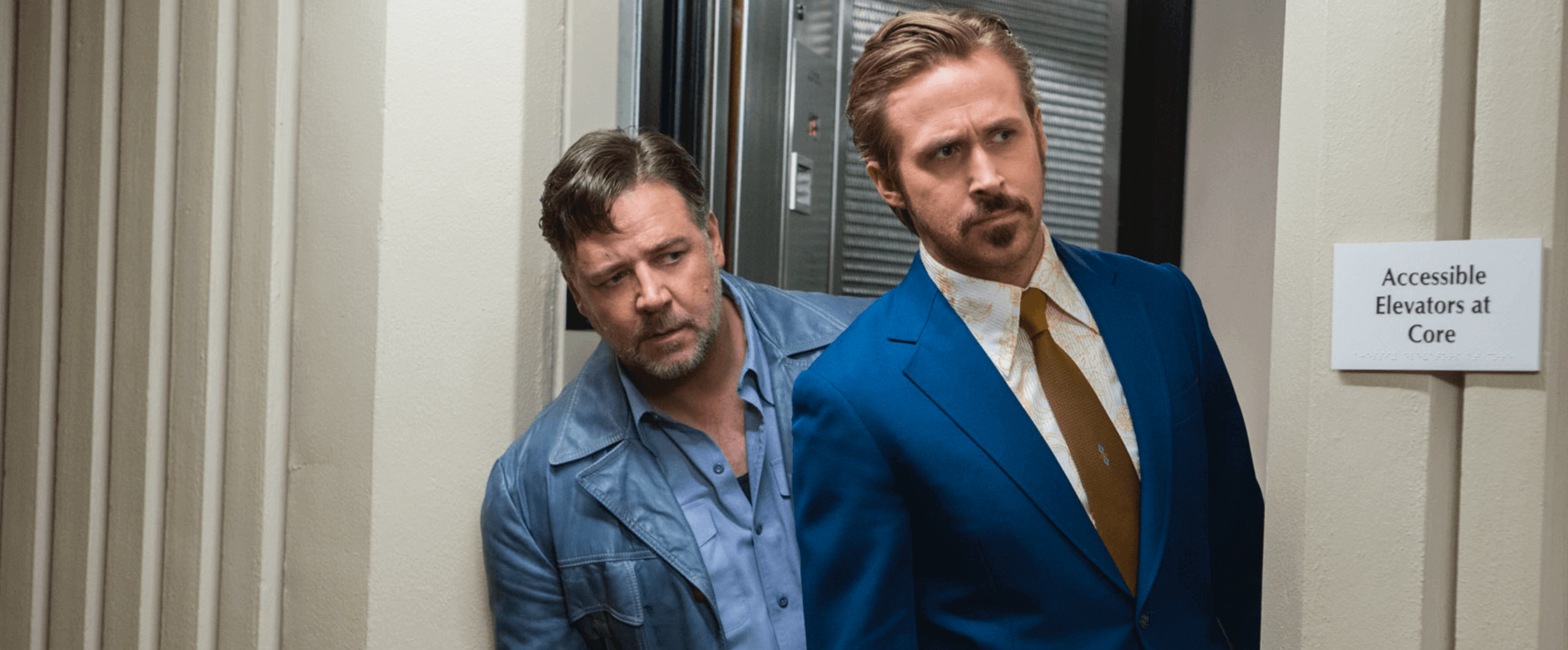The Nice Guys (2016) is the latest buddy cop comedy from Shane Black. Set in Hollywood in 1977, the movie follows off-the-books detectives played by Ryan Gosling and Russell Crowe as they look for a missing girl. Angourie Rice also stars as Gosling’s precocious daughter.
Clichés on clichés. The Nice Guys is constructed entirely from tropes, from the buddy-cop formula that writer/director Shane Black invented nearly thirty years ago to the even older missing girl noire setup to the predictable reveal of who’s pulling the strings. Unlike Black’s previous original film, Kiss Kiss Bang Bang, The Nice Guys plays these tropes more or less straight; whereas Robert Downey Jr.’s narration in Kiss Kiss Bang Bang was subversive and fun, here Gosling’s and Crowe’s are flat and to-the-point, complete with clunky one-liners and period-appropriate pop culture references.
Immaculately constructed. None of which is a slight on the quality of the film itself. Everything from the late-70s sets and costumes to the rapid-fire dialogue to the complex action choreography is perfectly calibrated, to the point that most of the jokes that don’t land feel intentionally unfunny. The best scene in the film takes place at its midpoint when Gosling, Crowe, and Rice’s characters infiltrate a porn director’s outlandish party while hunting for their missing dame. They split up and the script tracks their interweaving paths through the colorful chaos with such grace that the audience always knows where everyone is at any given moment. When violence finally breaks out, nothing is missed or left behind, and the many moving pieces remain clear in the viewer’s mind.
Brick jokes aplenty. While some of the dialogue is clunky (possibly intentionally), the script is carefully balanced and full of callbacks and brick jokes which reward attentive viewing. A Gosling dream sequence featuring a self-driving car and a giant anthropomorphized bee set up one of the funniest jokes in the entire film, and Crowe’s story about former president Richard Nixon is the best self-contained bit even before the callback. Ultimately, the low-key nature of the script pays off in the long run even though it takes a while to get going and peters out right around the beginning of Act Three.
A lack of confidence. The biggest flaw with The Nice Guys is that it doesn’t have enough confidence in itself. Like most movies, it goes on for too long, and cannot resist the temptation to tie everything up in a neat bow, while the outlandish final sequence has plenty of laughs, it lacks the grace of the earlier set pieces. If ever a movie called for a downer ending à la Chinatown, it is The Nice Guys, but when the film enters the third act and careens towards the inevitable conclusion it begins to lose some of the ramshackle charms that defined its first sections. While there are hints at subversion throughout, the tropes from which the film is built are almost all played straight in the end, which is disappointing given Black’s hilarious deconstruction of some of the same material in Kiss Kiss Bang Bang. What could have been a mainstream version of Inherent Vice conforms more to the 1980s mold that Black himself cast with Lethal Weapon — that failure to update the formula for the 21st century keeps The Nice Guys from being a true classic.
The Nice Guys is a well-constructed throwback to 1980s action films, a faithful recreation of an old genre.

